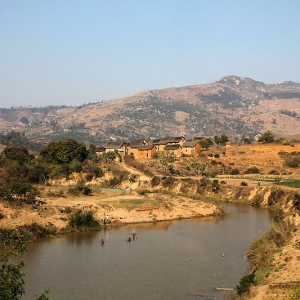Federal Water Tap, December 6: Senate Bill Would Allow Arizona Tribe to Lease Colorado River Water
The Rundown
- Arizona senators introduce a bill to allow off-reservation leasing of Colorado River water by the Colorado River Indian Tribes.
- The USDA will survey Wisconsin homes and businesses near farmland to learn about contaminants in private wells.
- The EPA allocates $7.4 billion in water and sewer funds from the infrastructure bill to states, tribes, and territories for 2022.
- The EPA also proposes a timeline for setting limits on PCBs in the Spokane River, in Washington state and it blocks a flood-control project in the Mississippi delta.
And lastly, U.S. and Canadian negotiators will meet on December 9 for another round of talks on updating the Columbia River Treaty.
“What we don’t want is the pressure of time to cause communities to spend the money in a way that is not optimal.” — Rep. Dan Kildee (D-MI) discussing the use of American Rescue Plan Act funds for water and sewer infrastructure. The act provided $350 billion to local, state, and tribal governments that could be used for broadband, water and sewer, lost revenue, and pandemic response. The funds are supposed to be obligated to a project by December 31, 2024 and spent by December 31, 2026. But Kildee said he wants to make sure that once a spending plan is in place, the funds could be used even if the plan takes longer than five years to complete. Kildee added that this fix might require congressional legislation.
By the Numbers
$7.4 Billion: Water and sewer funding from the infrastructure bill that the U.S. Environmental Protection Agency will distribute to states, tribes, and territories in 2022. The funds will be funneled through the state revolving funds. A letter from Michael Regan, the EPA administrator, lists funding by state.
News Briefs
Leasing Colorado River Water in Arizona
Arizona senators introduced legislation that would allow the Colorado River Indian Tribes to lease water for use in Arizona off of the reservation.
CRIT has one of the largest and most secure claims to Colorado River water in the state, but it cannot send that water to users elsewhere in the state without Congress’s approval.
The move is designed to be mutually beneficial. CRIT, whose lands are along the river in western Arizona, would be compensated for leasing its water to cities or farms at a time when Arizona is facing cutbacks in Colorado River water.
The legislation states that leases must not exceed 100 years and must be approved by the secretary of the Interior. It also allows leased water to be stored underground.
In Arizona, tribes that receive Colorado River water from the Central Arizona Project canal are allowed to lease their water. Several have done so, including the Gila River Indian Community, which signed a $27.6 million agreement with Phoenix in 2008. Under the 100-year lease, the tribe provides 15,000 acre-feet per year to the city.
CRIT leadership sought this action, which tribe members endorsed despite some opposition.
In context: Colorado River Indian Tribes Take Another Step Toward Marketing Valuable Water in Arizona
Spokane River PCBs
The EPA issued a proposed settlement with environmental groups and the Spokane Tribe of Indians that would establish a timeline for the agency to set limits on PCBs in the Spokane River and Little Spokane River.
The proposal would require the agency to act by September 30, 2024.
Studies and Reports
EPA Restores Veto of Mississippi Flood Project
In a letter to the Army Corps, EPA Administrator Michael Regan said that the agency will stand by a 2008 decision to block a flood-control project in the Mississippi delta.
The agency initially opposed the Yazoo Pumps Project because of the damage it would cause to fish, wildlife, and about 67,000 acres of wetlands that are important filters of pollutants. Then in 2020 the Trump administration attempted to reverse the veto.
Mississippi’s Republican senators were not pleased with the agency’s restoration of the veto, vowing to fight the decision.
On the Radar
Water Well Survey in Wisconsin
The U.S. Department of Agriculture’s statistical service will survey Wisconsin homes and businesses that use private wells near farmland.
The goal of the survey is to learn about contaminants that are in well water. The most concerning contaminants are nitrates and pesticides. According to Wisconsin regulators, about a quarter of the state’s people use a private well.
The USDA says the data will inform discussions with the EPA about pesticide use.
Columbia River Treaty Negotiations
U.S. and Canadian negotiators will meet on December 9 for another round of talks over the treaty that governs the Columbia River, whose basin extends across both countries.
This will be the eleventh meeting to discuss updates to a treaty that went into effect in 1964. Key issues include flood control, hydropower generation, and ecosystem protection.
Federal Water Tap is a weekly digest spotting trends in U.S. government water policy. To get more water news, follow Circle of Blue on Twitter and sign up for our newsletter.
Brett writes about agriculture, energy, infrastructure, and the politics and economics of water in the United States. He also writes the Federal Water Tap, Circle of Blue’s weekly digest of U.S. government water news. He is the winner of two Society of Environmental Journalists reporting awards, one of the top honors in American environmental journalism: first place for explanatory reporting for a series on septic system pollution in the United States(2016) and third place for beat reporting in a small market (2014). He received the Sierra Club’s Distinguished Service Award in 2018. Brett lives in Seattle, where he hikes the mountains and bakes pies. Contact Brett Walton






Leave a Reply
Want to join the discussion?Feel free to contribute!